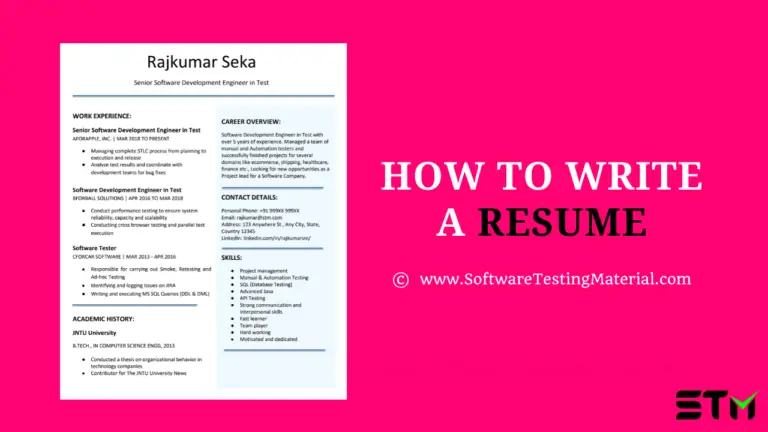10 Essential Software Testing Skills to Put on a Resume
In the competitive world of software testing, having a well-crafted resume is key to standing out among a sea of talented candidates.
Your resume serves as your personal marketing tool, showcasing not only your technical skills but also your problem-solving abilities, attention to detail, and experience in ensuring software quality.
Recruiters often spend just a few seconds skimming through resumes, so it’s important to highlight the most relevant skills to catch their interest and show why you’re a great fit for the role.
As companies keep innovating, the need for skilled testers who can tackle complex testing scenarios, stay updated with the latest testing tools, and help drive a team’s success is growing.
By sharpening your skills and showcasing them effectively, you can position yourself as a strong contender for opportunities in this dynamic field.

Software Testing Skills You Should Highlight On Your Resume
#1. Manual Testing
Manual testing is a core skill every software tester should master, involving the art of carefully examining software applications to identify bugs and ensure a smooth user experience.
One crucial aspect of manual testing is Test Case Design and Execution.
This involves creating detailed test cases that outline the specific conditions under which a tester will verify whether the software meets its requirements.
A well-structured test case acts not only as a handy checklist for validation but also helps in making the testing process more consistent.
By carefully going through each test case, testers can effectively validate functionality and usability while spotting any discrepancies that might affect performance.
Once the test cases are designed, execution is the next step.
Here, testers follow the steps outlined in their test cases. It’s important to keep a detailed record of results, noting any failures or unexpected behaviours, as this information becomes the foundation for the defect tracking and reporting phase.
Defect Tracking and Reporting is all about communicating issues found during testing to the development team.
A skilled tester uses clear, concise language and precise steps to reproduce the defect, ensuring that developers have everything they need to fix the issues swiftly.
Properly tracking and reporting defects not only aids in improving the software product but also plays a vital role in enhancing team collaboration and transparency.
By highlighting expertise in these areas on your resume, you can demonstrate your solid grasp of manual testing practices, making you an attractive candidate in the ever-evolving job market for software testers.
Here are few ways to effectively highlight your manual testing skills on your resume:
- Test Case Creation: Highlight your proficiency in developing comprehensive test cases, for example, “Designed and executed over 150 detailed test cases for various applications, ensuring thorough coverage of functional and non-functional requirements.“
- Defect Reporting: Emphasise your ability to identify and document defects with clarity, such as, “Logged and tracked over 200 defects using JIRA, providing detailed descriptions and steps to reproduce, which facilitated quicker resolution by the development team.“
- User Acceptance Testing (UAT): Showcase your experience in coordinating UAT efforts, for example, “Led UAT sessions with end-users to validate system functionality, gathering and documenting feedback that directly influenced product adjustments and enhancements.“
#2. Test Automation
Mastering test automation is essential for any tester looking to enhance their skill set.
Popular automation tools, such as Selenium and Cypress, have become industry standards due to their flexibility and powerful features.
Selenium, for instance, is a robust framework that supports multiple programming languages, including Java and Python, allowing testers to write scripts that can automate web applications across different browsers.
On the other hand, Cypress shines with its simple installation and user-friendly interface, making it a great choice for end-to-end testing, especially in JavaScript applications.
When it comes to scripting languages, proficiency in languages like Python and Java is invaluable.
Python, with its readable syntax and extensive libraries, enables testers to write efficient automated tests quickly.
Java, being widely used in enterprise environments, is another strong choice, particularly for those working with Selenium.
By showcasing your experience with these tools and languages on your resume, you not only highlight your technical capabilities but also demonstrate your commitment to streamlining the testing process, making you a desirable candidate in today’s competitive job market.
Here are few ways to effectively highlight your test automation skills on your resume:
- Automation Framework Development: Highlight your skills in building and maintaining test automation frameworks, for example, “Developed a robust test automation framework using Selenium and TestNG, which reduced testing time by 40% and improved the accuracy of regression tests.“
- Script Creation and Execution: Emphasise your experience in creating and executing automated test scripts, such as, “Designed and wrote over 300 automated test scripts for critical application features, resulting in consistent execution and rapid feedback cycles.“
- Continuous Integration (CI) Implementation: Showcase your role in integrating test automation within CI pipelines, for example, “Integrated automated tests into Jenkins CI/CD pipelines, enabling immediate testing for each build and significantly decreasing the time to detect defects.“
#3. API Testing
Understanding RESTful APIs is a crucial skill for modern software testers.
APIs, or Application Programming Interfaces, serve as the bridge between different software applications, allowing them to communicate and share data seamlessly.
REST (Representational State Transfer) is an architectural style that relies on stateless communication, using standard HTTP methods like GET, POST, PUT, and DELETE.
Familiarity with these concepts empowers testers to ensure that APIs function correctly and efficiently, providing a reliable backend for applications.
Tools like Postman and SoapUI are invaluable for testers diving into API testing.
Postman offers an intuitive interface for crafting requests and inspecting responses, making it easy to test RESTful APIs without writing extensive code.
You can easily set up different environments, run automated tests, and even generate code snippets in various languages—perfect for demonstrating your hands-on experience on your resume.
Meanwhile, SoapUI, with its robust capabilities for testing SOAP and REST APIs, provides advanced features such as service emulation, security testing, and load testing, helping you dig deeper into API functionality.
By highlighting your understanding of RESTful APIs along with your experience using tools like Postman or SoapUI on your resume, you not only showcase your technical skill set but also your ability to contribute to the overall quality and performance of software products.
In a world where backend reliability is paramount, your proficiency in API testing becomes a valuable asset for any potential employer.
Here are few ways to effectively highlight your API Testing skills on your resume:
- API Test Design: Detail your capability in crafting effective test cases for APIs, for instance, “Designed comprehensive API test cases for over 50 endpoints, ensuring validation of all response codes, data formats, and error handling scenarios.“
- API Testing Tools Proficiency: Highlight your experience with various API testing tools, such as, “Utilised Postman and SoapUI to execute API tests, significantly improving the efficiency of the testing process and enhancing collaboration with development teams.“
- Performance Testing of APIs: Emphasise your skills in assessing API performance, for example, “Conducted performance testing using JMeter, identifying bottlenecks and ensuring that the API could handle over 10,000 concurrent requests without degradation of service.“
#4. Analytical Thinking
In the realm of software testing, two soft skills that stand out are problem-solving abilities and attention to detail.
These skills not only enhance a tester’s effectiveness but also contribute significantly to the quality of the final product.
Problem-solving abilities are crucial for a software tester.
When issues or bugs arise, a tester must quickly figure out what went wrong and how to fix it. This skill helps ensure the software works correctly and meets user expectations.
A good problem-solver can also find ways to improve testing processes, making the overall quality of the software better.
Without strong problem-solving skills, a tester may struggle to keep up with challenges, which can lead to delays and lower-quality products.
Attention to detail is extremely important for a software tester. It helps testers spot small bugs or defect that could cause big problems later.
By being careful and thorough, testers make sure that every part of the software works correctly.
This skill ensures users have a smooth experience and that the final product is high quality.
Without good attention to detail, errors can go unnoticed, leading to unhappy users and costly fixes.
Highlighting these skills on your resume showcases your dedication to quality and your ability to contribute to a team that values excellence in every aspect of project delivery.
Here are few ways to effectively highlight your Analytical Thinking skills on your resume:
- Critical Problem Solving: Illustrate your analytical skills by detailing your approach to tackling complex testing challenges, for instance, “Resolved critical production issues by performing root cause analysis and implementing corrective measures that reduced system downtime by 30%.“
- Data Analysis for Testing Metrics: Showcase your ability to leverage data for testing insights, such as, “Conducted in-depth analysis of testing metrics to identify trends and areas for improvement, resulting in a 25% increase in test coverage over six months.“
- Test Optimization Strategies: Highlight your capacity for optimizing test processes, for example, “Analyzed existing test cases and implemented a risk-based testing approach, streamlining the testing process and reducing the overall testing time by 40% while maintaining quality standards.“
#5. Communication Skills
Communication skills are crucial for software testers, especially when it comes to writing documentation and collaborating verbally with others.
Testers need to share their findings clearly, which helps the whole team understand any issues with the software.
Good communication makes it easier to discuss problems and work together to find solutions.
When testers write reports or document their testing processes, they must do so in a way that is easy for everyone to understand.
This helps avoid confusion and ensures that everyone is on the same page.
Overall, strong communication skills allow testers to collaborate effectively, improving the quality of the software and the team’s success.
Showcasing your communication skills on your resume highlights your ability to bridge gaps and keep everyone in sync, a valuable asset in any team setting.
Here are few ways to effectively highlight your Communication skills on your resume:
- Clear Reporting: Highlight your ability to convey complex information clearly, such as, “Created detailed testing reports that effectively communicated findings and recommendations to both technical and non-technical stakeholders, facilitating informed decision-making.“
- Team Collaboration: Emphasise your role in fostering collaboration within teams, for example, “Collaborated with developers and project managers by leading weekly stand-up meetings, ensuring all team members were aligned on testing goals and project timelines.“
- Feedback Facilitation: Showcase your experience in providing and receiving feedback, such as, “Conducted peer reviews of testing processes and provided constructive feedback that contributed to continuous improvement, enhancing overall team performance and morale.“
#6. Time Management
Time management is very important for software testers because they often have multiple tasks to complete within tight deadlines.
Being able to plan and organise their time helps testers get their work done efficiently, ensuring that all tests are completed before the software is released.
This skill allows testers to prioritise their tasks, focusing on the most critical testing first so that any issues can be fixed quickly.
When you highlight your time management skills on your resume, it shows employers that you can handle responsibilities well, keep projects on track, and deliver results on time.
This is an essential quality for any team that aims to succeed in a fast-paced environment.
Here are few ways to effectively highlight your Time management skills on your resume:
- Prioritisation of Tasks: Include specific instances where you effectively prioritised tasks to meet critical deadlines, such as, “Successfully managed testing schedules for multiple projects, ensuring completion of high-priority tests ahead of release dates.“
- Project Management Tools: Mention the tools or methodologies you used to enhance your time management, like, “Utilised Agile project management techniques to organise testing phases, resulting in a 20% increase in efficiency.“
- Meeting Deadlines: Highlight your track record of consistently meeting deadlines, for example, “Achieved 95% on-time delivery of testing phases across all projects, contributing to a smoother development lifecycle and enhanced product quality.“
#7. Agile Methodologies
Knowledge on agile methodologies are very important for software testers because they help teams work faster and more effectively.
Agile focuses on collaboration, quick feedback, and adapting to changes, which means testers need to be flexible and ready to communicate with developers and other team members.
Companies look for Agile testers because they understand how to work in a fast-paced environment, help improve software quality quickly, and respond to user feedback effectively.
To highlight Agile experience on your resume, you can include specific phrases like “Participated in daily stand-up meetings” or “Collaborated with cross-functional teams in an Agile environment.”
You can also mention any Agile certifications you have, such as Certified Scrum Master (CSM) or Agile Tester Certification.
Showing that you are comfortable with Agile principles will make you a strong candidate for many testing roles.
Here are few ways to effectively highlight your knowledge on Agile methodologies on your resume:
- Scrum Implementation: Highlight your experience in applying Scrum methodologies, for example, “Facilitated daily stand-up meetings for teams, ensuring clear communication of progress and obstacles, which increased team efficiency by 30%.“
- User Story Creation and Management: Illustrate your capability in writing and managing user stories, such as, “Developed and prioritised over 150 user stories for the product backlog, ensuring alignment with stakeholder requirements and enhancing project transparency.“
- Sprint Retrospective Practices: Detail your involvement in conducting sprint retrospectives, for instance, “Led sprint retrospectives that fostered open feedback and continuous improvement, resulting in actionable insights that improved team performance by 25% in subsequent sprints.“
#8. Security Testing
Security testing skills are increasingly important for software testers in today’s digital landscape.
As cyber threats evolve, organizations need to ensure their software is secure against potential vulnerabilities that could be exploited by hackers.
Consequently, companies look for security testers to help identify weaknesses in their systems before they can be targeted.
Skilled security testers not only safeguard data but also protect the company’s reputation and customer trust.
Mention any experience you have with security tools (like OWASP ZAP, Burp Suite, and Nessus) and techniques, like penetration testing or vulnerability assessments.
This doesn’t just mean knowing how to run tests; it also involves having a basic understanding of common vulnerabilities that can affect applications.
Familiarity with security concepts like SQL injection, cross-site scripting (XSS), and buffer overflows can empower you to identify potential weaknesses before they become serious issues.
Additionally, describe projects where you played a role in ensuring software security, emphasizing your contribution to maintaining a secure environment.
By highlighting your basic knowledge of common vulnerabilities alongside your experience with security testing tools, you illustrate your commitment to delivering secure, reliable software—an essential quality that employers highly value in today’s tech-driven world.
Here are few ways to effectively highlight your Security testing skills on your resume:
- Security Testing Methodologies: Highlight your knowledge in various security testing techniques, for example, “Implemented OWASP Top Ten guidelines during security assessments, identifying and mitigating common vulnerabilities, which enhanced overall application security posture.“
- Vulnerability Assessment Tools: Emphasise your hands-on experience with security tools, such as, “Utilised tools like Burp Suite and Nessus to perform comprehensive vulnerability scans, allowing the team to proactively address security flaws before deployment.“
- Penetration Testing Execution: Illustrate your skills in conducting penetration tests, for instance, “Conducted thorough penetration tests on web applications, successfully simulating attacks to uncover critical security weaknesses, leading to a 40% reduction in potential exploits reported.“
#9. Performance Testing
Performance testing is a key skill for software testers. Organizations prefer software testers with performance testing skills because they ensure applications perform well under heavy use.
Having hands-on experience with performance testing tools such as JMeter, LoadRunner, or Gatling can significantly enhance your effectiveness as a tester.
These tools enable you to simulate a variety of user loads, capturing important metrics related to response times, throughput, and resource utilization.
By regularly engaging in performance testing, you not only help ensure that applications are responsive and reliable but also contribute to an overall better user experience.
Highlighting these skills on your resume shows that you’re proactive about performance and dedicated to quality—traits that are invaluable in the tech industry today.
Here are few ways to effectively highlight your Performance testing skills on your resume:
- Load Testing Procedures: Demonstrate your proficiency in conducting load testing, such as, “Executed load testing using JMeter to simulate user traffic of over 10,000 concurrent sessions, identifying performance bottlenecks and ensuring the application met scalability requirements.“
- Stress Testing Methodologies: Highlight your experience with stress testing approaches, for example, “Implemented stress testing scenarios that pushed the application to its limits, uncovering breaking points and informing the development team on necessary optimisations to enhance stability.“
- Performance Monitoring Tools: Emphasise your use of performance monitoring tools, such as, “Utilised tools like New Relic and Grafana to gather real-time performance metrics, enabling proactive monitoring and quick response to performance degradation issues during peak usage times.“
#10. Proficiency with Testing Tools
Proficiency with testing tools is vital for any software tester. Testing tools help in finding and fixing bugs, managing tests, and ensuring software quality.
Bug tracking tools, like JIRA or Bugzilla, allow testers to efficiently log, track, and manage bugs throughout the development lifecycle.
Test management tools, such as TestRail or Zephyr, help organize test cases and measure testing progress.
Automation testing tools, like Selenium or Cypress, enable testers to run tests automatically, which saves time and improves accuracy.
Additionally, version control tools, such as Git, help manage changes to the code, making it easier to collaborate with developers.
Being skilled in these tools not only enhances a tester’s efficiency but also contributes to the overall success of software projects.
Employers look for candidates who are skilled in these areas, as it shows they can work effectively in today’s fast-paced development environments.
By highlighting your proficiency in these key tools and technologies on your resume, you not only showcase your technical capabilities but also your commitment to delivering high-quality software.
Here are few ways to effectively highlight your Testing tools proficiency on your resume:
- Automated Testing Frameworks: Highlight your competency in automated testing, for instance, “Developed and maintained an automated testing suite using Selenium, resulting in a 50% reduction in testing time and improved overall software quality through consistent regression testing.“
- Static Code Analysis Tools: Illustrate your ability to utilise static code analysis tools, such as, “Employed SonarQube to conduct regular code quality checks, identifying vulnerabilities and code smells early in the development process, which enhanced team adherence to coding standards.“
- API Testing Solutions: Demonstrate your skills in API testing by stating, “Conducted thorough API testing using Postman and SoapUI, validating endpoints for functionality, security, and performance, ensuring seamless integration between services and enhancing overall system reliability.“
Bonus Skill
#11. Staying Updated on Industry Trends
The software industry is constantly changing, with new tools, frameworks, and best practices emerging regularly.
To maintain a competitive edge, sit’s a good idea for software testers to stay engaged with industry news and updates.
You can do this by subscribing to relevant blogs, attending webinars, and joining professional forums and communities.
Check out our yearly updated posts on Software Testing Trends & Mobile App Testing Trends.
By staying informed about the latest in testing tools and practices, you can boost your skills and bring fresh, innovative solutions to your projects!
Here are few ways to effectively highlight your commitment to staying updated on industry trends within your resume:
- Professional Development Courses: Include a section that lists relevant courses or certifications you have completed. For instance, you might state, “Completed a certification in Agile Testing Principles from [Institution Name],” to showcase your dedication to learning modern methodologies.
- Attendance at Conferences and Webinars: Mention any relevant conferences, webinars, or workshops you’ve attended. An example could be, “Attended the [Specific Conference] in [Year], where I gained insight into emerging testing technologies and networked with industry leaders,” illustrating your initiative to stay informed and connected.
- Following Industry Blogs: Include a point about your engagement with relevant industry blogs. For example, you might say, “Regularly follow the Software Testing Material blog to stay updated on the latest software testing trends and access webinars,” showcasing your commitment to continual learning and awareness of industry movements.
Frequently Asked Questions
What’s the difference between hard skills and soft skills?
Hard skills are specific, teachable abilities you can measure, like using testing software or coding languages. You often gain these through education, training, or experience. Soft skills, however, are personal qualities that help you get along with others, like communication, teamwork, and problem-solving. While hard skills are crucial for technical tasks, soft skills are key for working well in teams and adapting to changes. Both types of skills are valuable in any workplace!
Why should you list skills on your resume?
Listing skills on your resume is important because it helps employers quickly see what you can do. Skills highlight your ability to perform specific tasks and can help you stand out from other candidates. Including both hard skills and soft skills gives a complete picture of your qualifications. It also makes it easier for hiring managers to match your skills with the job requirements, increasing your chances of getting an interview.
Where do skills go on a resume?
Skills can be placed in a specific section called “Skills” or “Core Competencies” on your resume. This section typically appears near the top, after your summary or objective statement. You can also include skills within your work experience descriptions, showing how you used them in past jobs. Make sure to highlight the most relevant skills that match the job you’re applying for to catch the employer’s attention.
What kind of skills should I include in my resume?
When deciding what skills to include in your resume, focus on both hard and soft skills that are relevant to the job you’re applying for. Hard skills might include things like computer programs you know, languages you speak, or specific tools you can operate. Soft skills could be qualities like being a good communicator, being reliable, or having strong teamwork abilities. Make sure to choose skills that match the job description to show that you’re a good fit for the position.
What top skills do employers look for?
Employers often look for a mix of technical and personal skills. Some top skills include communication skills, which help you share ideas clearly; teamwork skills, which are important for working well with others; and problem-solving skills, which show your ability to find solutions. Additionally, being adaptable is critical, as it shows you can handle change and learn new things quickly. Lastly, having strong time management skills can help ensure that you meet deadlines and manage your tasks efficiently.
How can I identify my skills?
To identify your skills, start by making a list of activities you enjoy or tasks you’ve completed successfully. Think about hobbies, volunteer work, or previous jobs. Ask friends or family what they believe you’re good at, as they might see strengths you overlook. You can also look at job descriptions for roles that interest you, which often highlight skills employers value. Finally, consider taking a skills assessment test, which can help pinpoint both your hard and soft skills.
How many skills should I include in my resume?
When including skills on your resume, aim for 5 to 10 key skills. This range ensures that your skills are highlighted without overwhelming the reader. Focus on the skills that are most relevant to the job you’re applying for, and make sure they align with the job description. Quality is more important than quantity, so choose the skills that showcase your strengths best.
What are the best skills for a candidate with no experience?
For candidates with no experience, focusing on soft skills is essential. Communication skills are vital, as they help you express ideas clearly. Reliability shows that you can be counted on to show up and do your tasks. Being willing to learn demonstrates your openness to new ideas and processes. Teamwork skills are also important, as many jobs require working well with others. Lastly, having a positive attitude can make a great impression and show you’re ready to take on challenges.
Conclusion
In summary, the top 10 software testing skills every software tester should highlight on their resume include technical proficiency in testing tools, strong analytical thinking, exceptional attention to detail, effective communication, collaboration skills, adaptability, problem-solving abilities, knowledge of Agile methodologies, programming fundamentals, and a customer-focused mindset.
By focusing on these key areas, you can demonstrate to potential employers that you possess the essential capabilities required for success in software testing.
Additionally, it’s good to keep in mind that the tech landscape is always changing. So, it’s important to keep building and updating your software testing skills to stay relevant.
Dive into professional development opportunities, attend workshops, and look for certifications to boost your expertise.
By investing in your growth, you’ll not only enhance your resume but also make yourself a valuable asset to any testing team.
Related posts:
- How to write Software Tester Resume
- 100+ Professional Resume Summary Examples for Software Testers
- 10 Professional Software Tester Cover Letter Examples to Land QA Jobs






